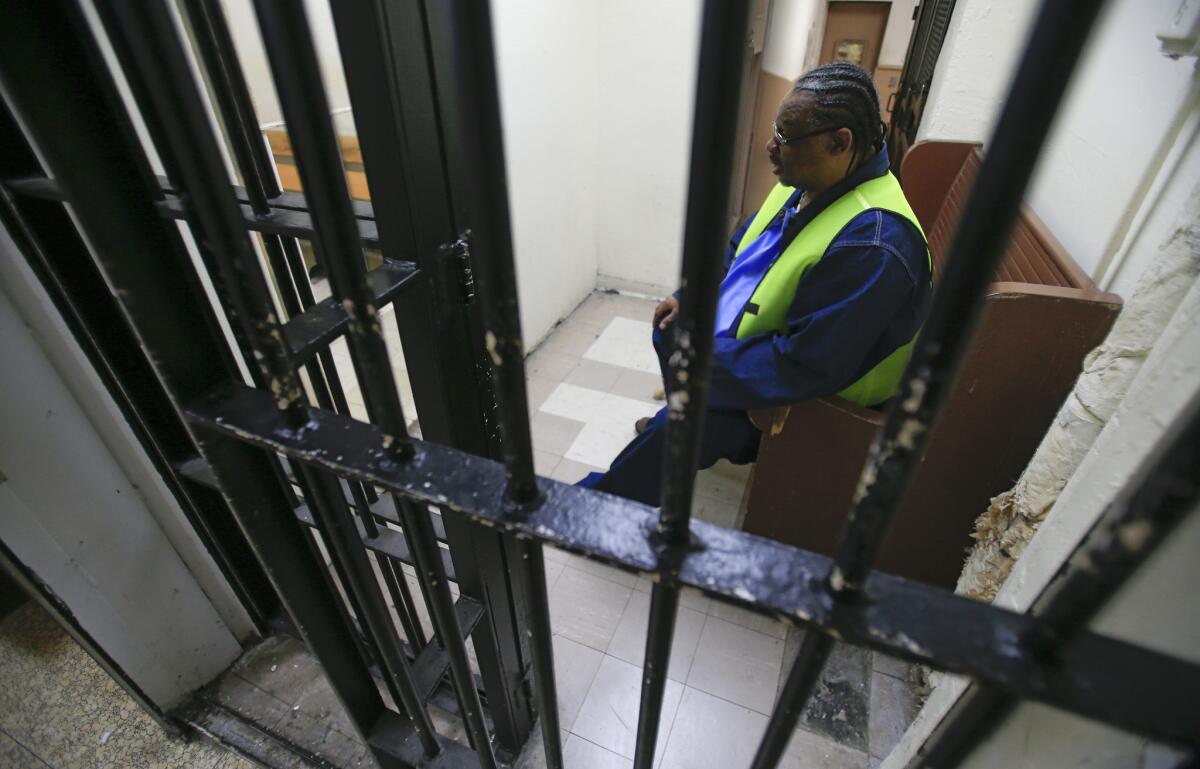New poll finds voters poised to pass Prop. 57 and revamp California’s prison parole rules

- Share via
Reporting from Sacramento — Gov. Jerry Brown’s effort to revise and ultimately loosen state prison parole rules appears to be on its way to passage on Nov. 8, as a new poll finds strong support across a wide swath of California voters.
Fifty-seven percent of likely voters in a new USC Dornsife/Los Angeles Times survey backed Brown’s Proposition 57, and only 31% were opposed. While earlier polling showed an even wider lead, the proposal has had consistently solid backing throughout the campaign season.
“Proposition 57 should pass comfortably,” said Ben Winston of Greenberg Quinlan Rosner Research, the Democratic pollster who makes up the bipartisan team that conducts the survey.
The measure, which would allow more prisoners a chance at parole and give additional authority to prison officials to award good-behavior credits, has wide appeal among the state’s young voters.
As many as two-thirds of the poll’s likely voters under the age of 40 supported Proposition 57, with the highest backing from younger white Californians. Support was at, or surpassed, the 60% threshold among Democrats, white voters who are “independent” of any political party and Latino women.
The only serious opposition came from registered Republicans, self-described conservatives and older, non-college-educated voters.
Young voters may be a harbinger of a dramatic long-term shift on crime and punishment in a state where long prison sentences for sensationalized crimes were once the hallmark of successful campaigns.
“This generation of California voters simply wasn’t alive when a tough-on-crime approach was necessary to win a statewide election,” said Dan Schnur, director of USC’s Unruh Institute of Politics.
Political analysts also point to a potential correlation in the poll between supporters of the parole overhaul and those who support Proposition 64, the effort to fully legalize marijuana. Seventy-one percent of the likely voters who support the marijuana measure also support Proposition 57.
“I think there are parallel issues here,” said Doug Herman, a Democratic strategist. “They’re making the point that the criminal justice system is broken.”
The ballot box guide to California’s propositions »
Brown has fought bitterly with district attorneys across California over Proposition 57, which he contends is simply offering the chance for a prisoner’s request to be heard by the state Board of Parole Hearings. Under the measure, parole commissioners could consider releasing any prisoner whose primary sentence was not for one of the state’s specifically listed violent crimes, and then only for secondary crimes or enhancements added at the time of sentencing.
Prosecutors, on the other hand, argue that Proposition 57 would almost certainly lead to the early release of dangerous criminals. And they believe the initiative’s expansion of good-behavior credits would mean less time behind bars even for high-risk predators.
The USC/Times poll, like most nonpartisan surveys, tested voter opinions by using Proposition 57’s official ballot title and summary — a description that has become a bone of contention during the campaign.
“The ballot title and summary is a gross and blatant misrepresentation of what this measure would do,” said Merced County Dist. Atty. Larry Morse. “It is incredibly dishonest.”
Law enforcement opponents dispute that new parole eligibility would be given only to offender, who are “nonviolent,” a word that Morse said he believes downplays the threat and thus artificially inflates any estimates of true voter support for the governor’s policy proposal.
“He knows damn good and well this applies to crimes that anyone would see as violent,” Morse said of Brown.
Dan Newman, a spokesman for the Proposition 57 campaign, said the measure is “exactly what voters want in a public safety policy — a focus on keeping dangerous offenders locked up while rehabilitating nonviolent offenders before they get out.”
While most of the focus is on the impact of revising prison parole procedures, Proposition 57 also would revoke provisions of a 2000 ballot measure that has sent some juvenile defendants into adult courtrooms. Prosecutors helped lead the campaign for that proposal 16 years ago, but Morse said he and other district attorneys now agree those teenagers should remain in the juvenile justice system.
Sign up for our daily Essential Politics newsletter »
The survey of 1,500 registered voters was conducted for USC Dornsife and the Los Angeles Times by Greenberg Quinlan Rosner Research and American Viewpoint. Support for the ballot initiative was almost identical among the entire sample — 58% in favor — as it was among likely voters.
The poll results come as both sides in the Proposition 57 campaign ramp up efforts to persuade voters. Brown has raised more than $19.7 million in support of the measure, with the largest share of that money spent during the spring on gathering signatures to quickly qualify the initiative for the ballot after skirmishes in court over whether it was properly vetted under state election law. The governor’s effort had enough money left over for campaign mailers and a statewide radio ad blitz, while opponents, having raised less than $1.4 million, have had fewer opportunities.
That imbalance may help explain another strong marker for the initiative in the poll: It was winning with 63% of voters who said they already have cast a ballot.
Follow @johnmyers on Twitter, sign up for our daily Essential Politics newsletter and listen to the weekly California Politics Podcast
ALSO:
Gov. Jerry Brown’s Prop 57 is a parole showdown with prosecutors
What you need to know about the 17 propositions on the Nov. 8 ballot
Track news on California ballot measures and campaigns










